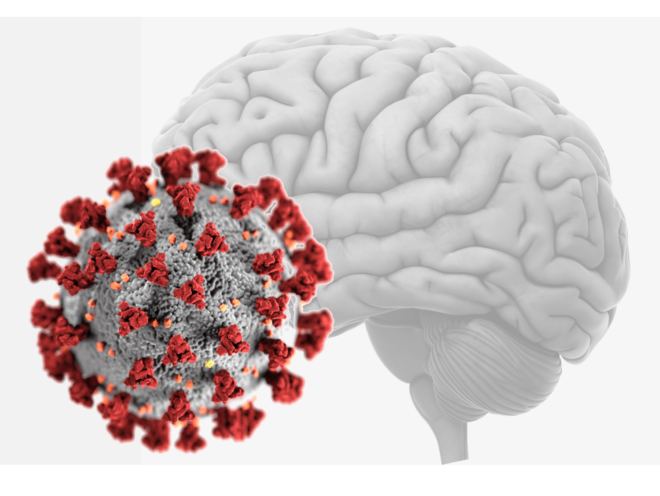Certain types of viral infections are associated with an increase in prevalence of depression relative to the general population. This may be directly related to infection of the CNS or an induced immune response.
Depressive symptoms have high prevalence and while in some cases they are tied to traumatic life events, often it comes with little known cause. Thus far there is little understanding of its underlying etiology, or perhaps, multiple etiologies. One interesting underlying possibility is viral infection.
Not everyone with every virus has depression obviously but there is substantially higher incidence of depression in those with specific viral infections relative to the general population. Here are some viruses that may cause depression.
Cytomegalovirus (CMV)
Cytomegalovirus or CMV (part of the herpes virus family) is a very common virus that spreads through body fluids, such as blood, saliva, urine, semen and breast milk. Most people who contract CMV have no symptoms but importantly there is no cure and once infected, people retain the virus for life. In the rare cases where there are symptoms, they are likely to be fatigue, fever, sore throat and muscle aches. The more common symptom may well be depression. Studies have found that in those seropositive for CMV, higher antibody levels are associated with higher incidence of depression. Conversely in another study subjects with the highest level of depression were more likely to be positive for CMV antibodies. While it is yet unknown how CMV infection induces depression, it is possible that it is not the virus itself that causes the infection but rather the specific antibodies or immune response. On the other hand, studies in mice have shown that the injection of the virus into the abdomen can result in its spread into central nervous system where it replicates in the brain parenchyma, causing a non-necrotic encephalitis and potentially other alterations as well.
Herpes Simplex Virus 2 (HSV-2)
Herpes Simplex-Virus 2 is a sexually transmitted infection that causes genital herpes. It is estimated that 13% of the global population under 50 is infected. While symptoms of herpes include painful blisters or ulcers at the site of infection, over 80% of people will not experience any symptoms of infection. But again, like CMV, once infected with HSV-2, the virus remains in the body for life. Studies have found that those with HSV-2 are at significantly higher risk for depression. However it is not yet clear if the depression arises from risky sexual behavior – which is also associated with depression – or the viral infection itself. On the other hand, the HSV-2 virus has been found in autopsied brains and symptoms of neonatal herpes simplex virus type 2 (HSV-2) infections of the CNS have been shown to significantly improve with suppressive oral acyclovir therapy and IV antiviral therapy.
Hepatitis C Virus (HCV)
The Hepatitis C Virus spreads through contact with blood from an infected person. Most people therefore become infected with the hepatitis C virus by sharing needles or other equipment used to prepare and inject drugs. While hepatitis C can be a short-term illness for some people, in the majority of people it is a long-term, chronic infection unless treated with antiviral drugs. And like both CMV and HSV-2, most people may be asymptomatic and therefore not know they have it. On the other hand, if symptoms do appear, they can be wide ranging since HCV can penetrate and replicate within numerous cells types in the body including the central nervous system.
HCV most prominently infects hepatocytes or liver cells resulting in a host of symptoms from jaundice to fatigue resulting in liver cirrhosis or even cancer. On the other hand, over half of infected individuals have neurologic and psychiatric manifestations. Depression is just one of them where various studies have shown the prevalence of depression in patients with HCV to be 1.5 to 4.0 times higher than that observed in the general population. Notably this was not the case for Hepatitis B, and clearance of HCV by antiviral treatments is associated with an improvement of both depression and quality of life, suggesting a specific viral induced effect.
Coronaviruses
Various members of the coronavirus family, including Covid-19 are also known to cross the blood brain barrier and infect the brain. However, a direct link with depression has not yet been studied.
See related post Coronavirus and the Brain
Mechanisms
Viral invasion of the CNS can result in a number of different kinds of disruptions from local and systemic inflammation and encephalitis and meningitis, to disruption of metabolic processes and neurotransmission and other immune-mediated phenomena. These may each impact resultant brain physiology and depression itself may have numerous manifestations in brain physiology. Unfortunately few people, if any, study the impact of viral infection on brain physiology.
However, while the mechanisms are not yet well understood, the link between viral infection and depression appears to be strong enough that it may be worthwhile to look for potentially dormant infections whose treatment, in the case of HSV-2 and HCV may have a significant impact on depressive symptoms.
References
Phillips et al. Cytomegalovirus is associated with depression and anxiety in older adults Brain Behavior and Immunity (2008)
(Miller et al., 2005)
Simanek et al. Herpesviruses, Inflammatory Markers and Incident Depression in a Longitudinal Study of Detroit Residents, Psychoneuroendocrinology, 2014
Slavuljica et al, Immunobiology of congenital cytomegalovirus infection of the central nervous system—the murine cytomegalovirus model, Cell Mol Immunol. 2015 Mar; 12(2): 180–191.
Pratt et al. The association of depression, risky sexual behaviours and herpes simplex virus type 2 in adults in NHANES, 2005-2008 Sex Transm Infection 2012
Fletcher et al, Hepatitis C virus and the brain, J Viral Hepatology, 2012

















For associations between influenza and depression see: Bornand D, Toovey S, Jick SS, Meier CR. The risk of new onset depression in association with influenza–A population-based observational study. Brain Behav Immun. 2016 Mar;53:131-137. doi: 10.1016/j.bbi.2015.12.005. Epub 2015 Dec 8. PMID: 26681501.
A needed debate. Thank you.
Dr. Toovey, I also think that influenza is related with depression and temporal increases in suicide rates.